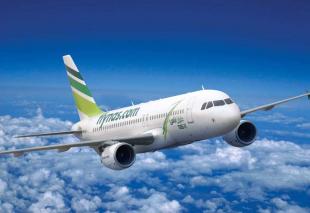

Nas Air eyes 2014 IPO to finance $2b jet purchase

Nas Air, Saudi Arabia's only low-cost carrier, plans an initial public offering (IPO) by 2014 as part of a five-year expansion plan which will see the airline more than double its fleet, the CEO of parent company National Air Services (Nas Holding) said.
“Our target date is probably the first quarter of 2014," Sulaiman Al Hamdan said in an interview with Arabian Business. “We are working extremely hard to enhance and improve our financials as this is one of the pre-requirements coupled with a solid business plan. We are about to start a new five-year business plan which will be approved the 8th or 9th January."
Hamdan said the IPO would be partial and would help finance aircraft acquisitions.
“That's something we will leave for the financial advisor and investment banks," Hamdan said when asked how much the carrier would seek to raise from the market. “We are talking to two banks and one of them will be chosen as a leading bank. They will do a proper valuation and then it will be decided."
The Riyadh-based carrier plans to lease as many as six aircraft in the first six months of next year and then buy about 20 new single-aisle planes from either Toulouse-based Airbus or Chicago-based Boeing, Hamdan said.
"By 2015 we should have 35 aircraft, today we have 15," he said, adding that the carrier is considering Boeing's 737-MAX, which will use 13 percent less fuel than current 737s, or Airbus's A320neo which will provide a 15 percent reduction in fuel consumption, two tonnes of additional payload, up to 500 nautical miles of more range, lower operating costs, along with reductions in engine noise and emissions. The first delivery of the 737-MAX is 2017 while the date for A320neo is 2016.
An order for 20 A320neos, at current average list prices, would amount to around US$2bn. The same order for the 737-MAX would be worth roughly US$1.9bn.
“We had serious discussions with both manufacturers, both Airbus and Boeing, and we are currently evaluating," Hamdan said. "We are looking at both what is most cost effective in terms of pricing and operating."
The airline, which is 37 percent owned by Prince Alwaleed bin Talal's Kingdom Holding, started operating in 2007 and has not made a profit to date, suffering losses due to higher oil prices and political instability that swept across the Arab world, causing it to withdraw from several countries. In 2010, Sama Airlines, another budget carrier that also operated in Saudi Arabia, suspended operations after amassing over US$300m in losses.
Saudi Arabia plans to open up its aviation market with the issuing of a third operating licence by the end of this year for which 14 companies have applied for, to operate both local and international flights. Qatar Airways, Bahrain Air and Gulf Air are among the carriers bidding for the licence.
A main criticism in Saudi Arabia has been that the fuel subsidy for national carrier Saudi Arabian and a cap on domestic fares has disadvantaged competitors.
Nas Air currently flies to six destinations within Saudi Arabia and 19 foreign routes. It withdrew from India, Syria and Yemen and is considering flying to destinations like Ethiopia and Iraq as part of its strategy to operate within a three-and-a-half-hour radius from its base in Saudi Arabia, Hamdan said.